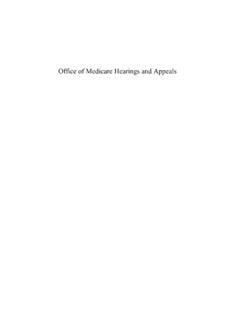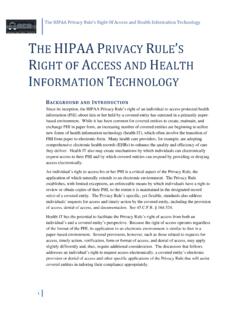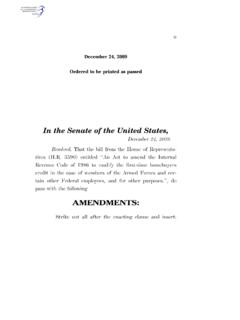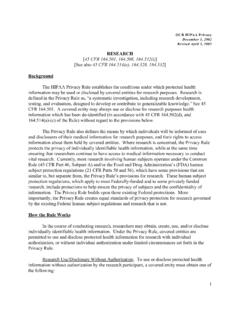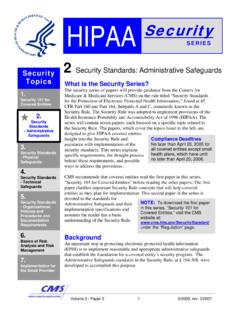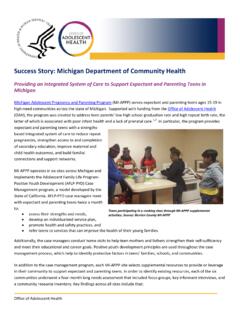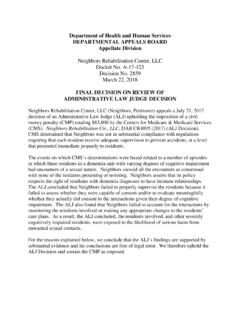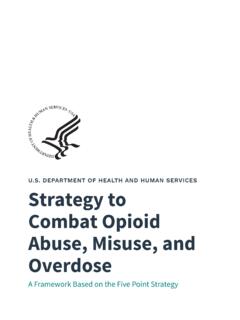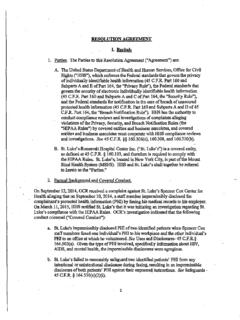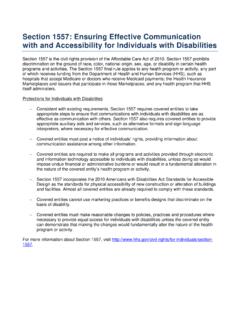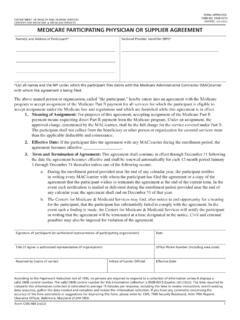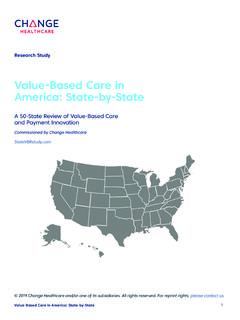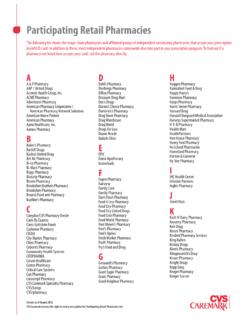Transcription of How to Participate in the Rulemaking Process
1 How to Participate in the Rulemaking Process 1 of 9 Federal regulation is one of the basic tools the government uses to carry out public policy. Agencies issue regulations (also known as "rules") through the Rulemaking Process when Congress provides the authority to do The public plays an extremely important role by commenting on proposed rules and other documents that solicit public input, such as requests for information that sometimes lead to formal Rulemaking . These comments can help shape the Department s decisions. INTRODUCTION TO THE Rulemaking Process What is a rule? Rules are government statements that either: Carry out or explain law or policy, or Describe an agency's organization or procedures.
2 The Department of Health and Human Services (HHS) issues and enforces rules on a broad range of topics. For example, HHS rules help ensure that: The foods we consume are safe. Private health information remains confidential. Day care centers, hospitals, and other institutions we trust to care for our loved ones operate at high standards. How does an agency identify the need for a rule? There are many reasons why an agency decides to begin the Rulemaking Process . These include: 1 Materials posted here are adapted from helpful resources provided by the Environmental Protection Agency, Department of Labor, and the Department of Transportation.
3 How to Participate in the Rulemaking Process 2 of 9 Legal (or Statutory) mandate. Congress may specifically require a rule or at least the initiation of the Rulemaking Process , sometimes with a deadline. Agency identification of a problem or potential reform. An agency may decide to either propose a new regulation or modify an existing regulation through a Process called retrospective review. It does this for a variety of reasons, including: o Exploring agency reforms that could produce savings or reduce burdens on the public. o Getting requests for interpretations or exemptions. o Identifying changes in technology that can improve the agency s practices.
4 O Identifying a problem because of an Inspector General report or other agency oversight. o Having difficulty enforcing existing rules. Petition for Rulemaking . HHS agencies often hear directly from regulated groups and other stakeholders regarding rules that they would like the Department to change. The public may ask or petition an agency to issue, modify, or withdraw a rule. The Department reviews these petitions to decide whether to take action. Advisory Committee, Government Accountability Office, or similar recommendations. Suggestions for rules may come from federal advisory committees, the HHS Office of the Inspector General, the Government Accountability Office, special commissions, or other bodies asked by Congress or the President to make recommendations on particular issues.
5 How does an agency initially determine the best solution to a problem? Before deciding to start the Rulemaking Process , an agency looks at different options or alternatives to address a problem. The Department explores whether it could fix the problem without issuing a rule. For example, could consumer reactions to a problem result in an industry making changes How to Participate in the Rulemaking Process 3 of 9 without a regulation? HHS also considers whether there are easier options, such as requiring the disclosure of information or labeling a product, which would achieve the goal. Agencies use economic analysis to help determine the best option and whether the benefits are greater than its costs.
6 How do public comments influence the development of a rule? Public comments play an important role in shaping and revising regulations. Here are a few examples: Based on feedback that some of the words used in the Designation Renewal of Head Start Grantees Proposed Rule could be confusing, the Administration for Children and Families 2011 Head Start Final Rule clarified and defined several terms. These changes help ensure that Head Start leaders across the country have clear expectations when competing for Head Start grants. In the 2012 Hospital Conditions of Participation Final Rule, the Centers for Medicare & Medicaid Services (CMS) made over a dozen significant changes based on public comments.
7 For example, CMS revised the proposed definition of medical staff to allow hospitals to include non-physician practitioners who would be eligible to receive hospital privileges under state law. CMS focused on reducing burden and costs for Medicare providers to promote more attention and time toward providing quality health care and efficient operations. The final rule saves nearly $5 billion over 5 years for Medicare providers. For more information about how comments make a difference, check out the handout Public Comments Make a Difference on How to Participate in the Rulemaking Process 4 of 9 HOW TO COMMENT ON REGULATIONS You can help shape regulations by commenting on the Department s proposed rules published in the Federal Register.
8 You can submit comments: Online at By mail, or In person at certain locations The rule published in the Federal Register will provide details on where to send comments. The most convenient way to submit comments for many people is through You can learn more about how to find a regulation open for public comment here. Additional information is also available in the Frequently Asked Questions on How to Participate in the Rulemaking Process 5 of 9 TIPS FOR SUBMITTING EFFECTIVE PUBLIC COMMENTS The most helpful comments clearly communicate and support your position, whether you are for or against the proposed action.
9 Below are some tips: 1. Plan Ahead. The comment period closes at 11:59 Eastern Time on the date comments are due. Planning ahead helps to ensure that you submit your comments well before the deadline. 2. Contact the Agency. If you have questions or do not understand a part of the regulatory document, reach out to the agency contact person listed on the document before submitting your comment. 3. Identify the Issues. In your comment, clearly identify which issues you are commenting on within the regulatory action. Provide the page number, column, and/or paragraph from the Federal Register if you are commenting on a particular word, phrase, or sentence.
10 4. Selection is Fine. You do not have to comment on every issue in a rule. You may select the issues on which you wish to comment. 5. Address Specific Agency Requests. The Department often requests comments on specific parts of proposed rules. This may be a helpful place to focus your comments. 6. Details, Details. Constructive, detailed comments (whether positive or negative) are most helpful. If you agree with a proposed action, your comments are helpful to show that the public wants or needs the proposed action. If you disagree with a proposed action, suggest an alternative (including not regulating at all) and include an explanation of how the alternative might meet the same objective or be more effective.
